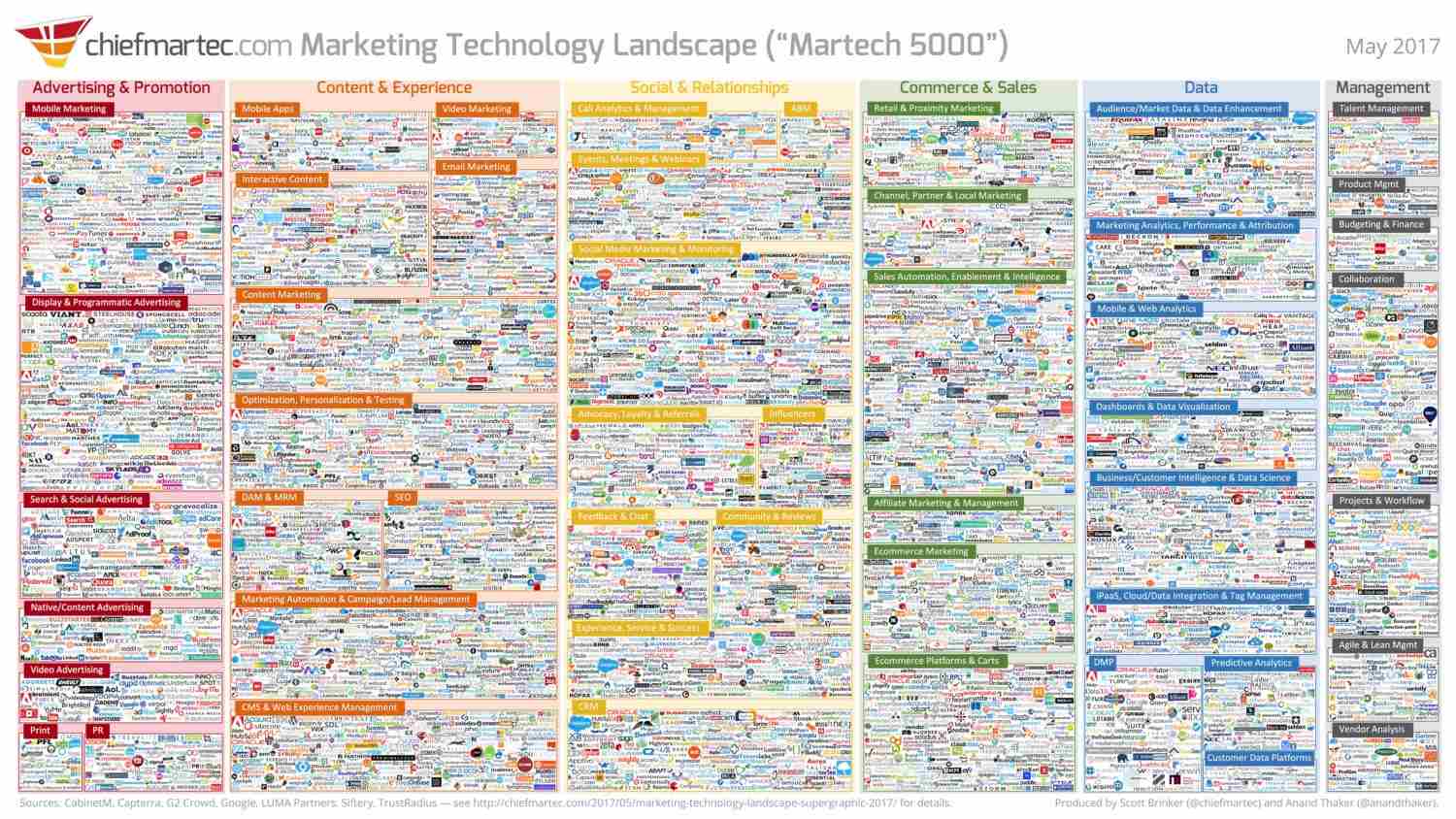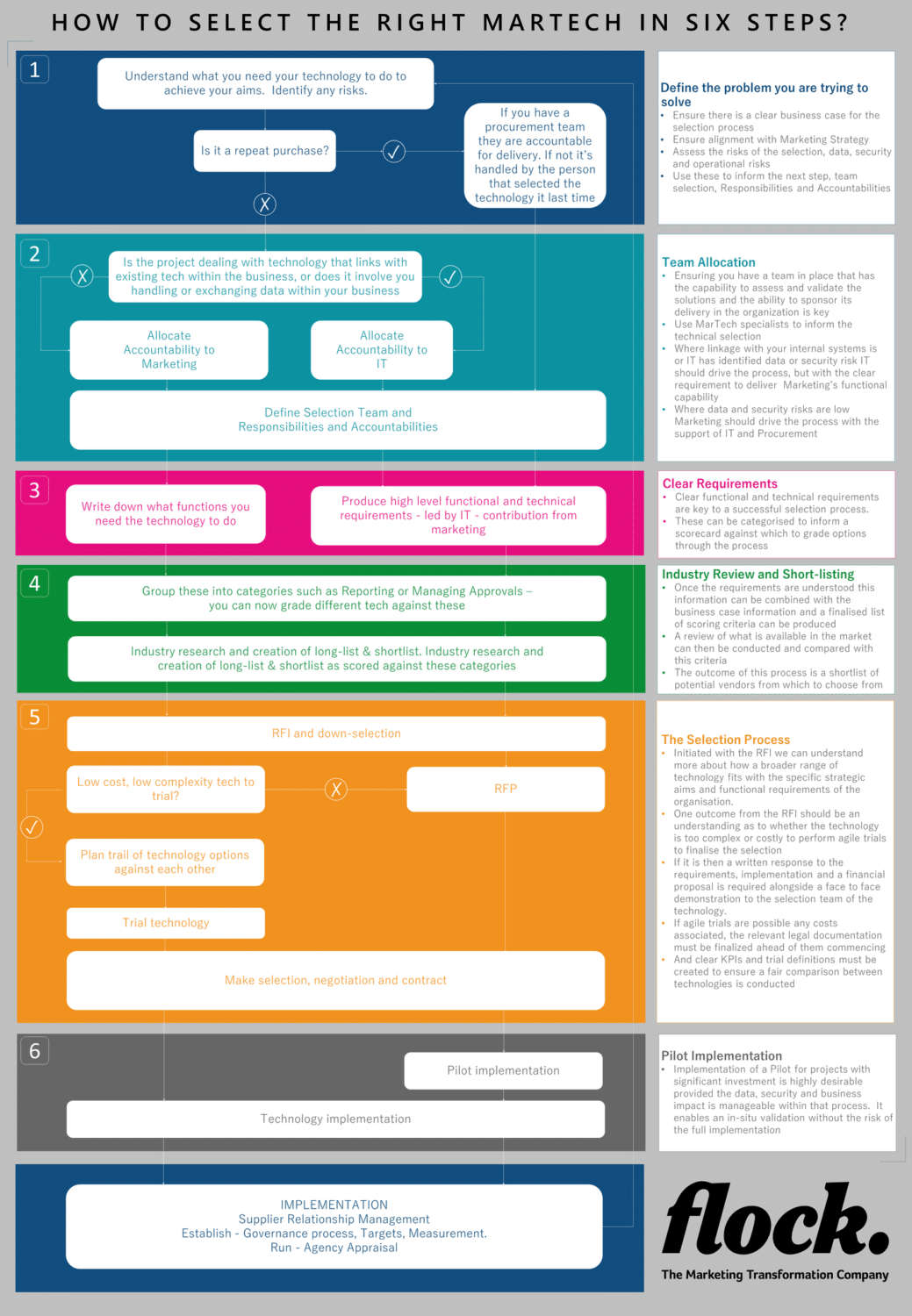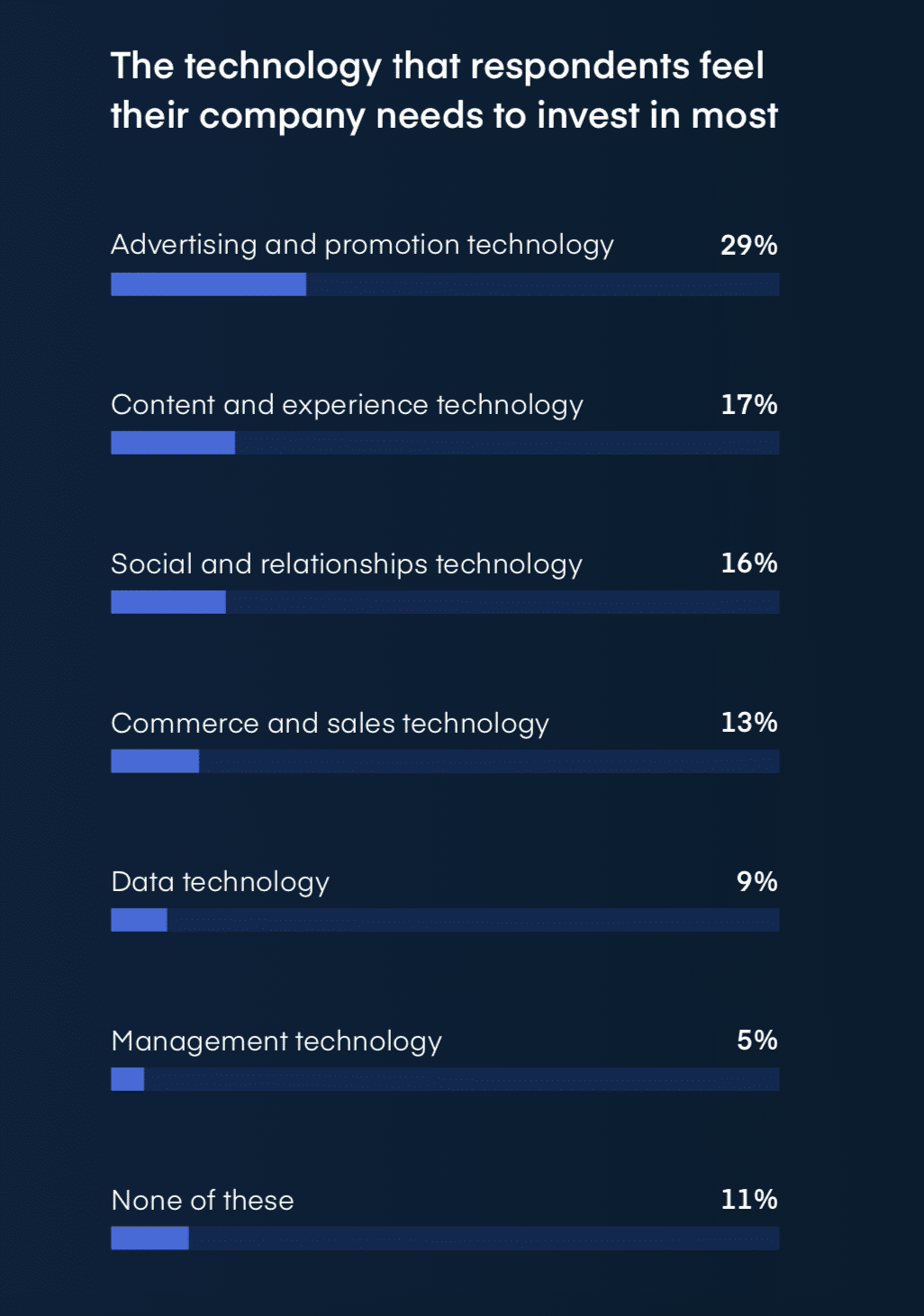Marketing technology (MarTech) has revolutionized the way that most areas of marketing are planned, executed, and evaluated. Due to the pandemic induced e-commerce boom, in 2021 and beyond, brand marketers MarTech needs worldwide have evolved towards all e-commerce related martech areas, including e-commerce marketing, advertising and multi-channel data collection, attribution, curation, enrichment and decisioning. Navigating the now 7k+ platforms that claim to help marketers understand, reach, engage, and measure their target audiences is no small task. Here is a primer on marketing technology – what you need to know about today’s MarTech platforms, how you can evaluate and select them for your specific needs, and how the industry will evolve in 2021.
The Basics
Marketing technology has traditionally come in the form of a software whose principle aim is to assist you in planning and carrying out marketing campaigns, gathering and analyzing the results, and applying insight to future campaigns.
At the most basic level, marketing technology can be broken down into six groups that marketing technology “godfather” Scott Brinker defined as:
• Advertising & Promotion
• Content & Experience
• Social & Relationships
• Commerce & Sales
• Data Management
Portada annually surveys hundreds of brand marketers in the Americas which of the above 5 categories of MarTech they will be mostly investing in the next 12 months. They are also asked what their priorities are within the top category. Here is our recently published survey on brand MarTech investments in 2021 and beyond.
and here our 2020 Portada Insight Report: What Brand Marketers Need from MarTech in 2020.
The advent of marketing technology can be brought back to 1999, when Salesforce launched the Software-as-a-Service model with the goal of making it unnecessary for organizations to spend a fortune to create their own bespoke CRM systems that were often slow and tedious to use. Under SaaS models, brands pay a monthly or yearly fee to use the tools offered. These tools can cost anywhere between $5,000 to $50,000 a year.
Fast forward and today, 29% of marketing budgets are dedicated to marketing technology, Ogilvy has a 900-person MarTech team, and MarTech software are being acquired for billions of dollars.
What MarTech Does for Marketers
The best MarTech tools will offer a combination of the following benefits:
- Automation of workflows: Most marketing technology solutions automate tasks that are too time-consuming and/or complex to complete manually, like pulling, organizing, and analyzing data.
- Support streamlined communication: Most MartTech services will enable better communication within and between work teams through tools that help teams track the status of projects and increase collaboration.
- Generate insights: MarTech solutions should do more than pull data – they should be able to draw actionable conclusions that support better decision-making, optimize campaigns, and reveal opportunities and gaps.
Breaking Down the Software Types
Perhaps the most basic way to break down marketing technology is to think about them as either point solutions, which provide tools that address one specific aspect of marketing, or suite solutions, that address more than one category of tools. When a vendor combines these tools under one platform, it is often called a MarTech stack. Whether a brand selects a point or a suite solution depends on a variety of factors determined by a campaign’s objectives and budget, and there are very good reasons for picking both.

To choose your suite of tools, it is important to consider your business model, marketing goals, and how your targets move down the marketing funnel. Often, products are more effective at assisting with a particular stage of the funnel than others, Smart marketers will make sure to combine tools whose tools will help you address the entire sales funnel. Getting to know the tools yourself will be important for both selecting and using them effectively: many of them offer free trials, which you can take advantage of when comparing your options.
Let’s dive a bit deeper into the types of tools a marketing technology solution might offer:
Content Marketing tools address the content production process, providing assistance with content management. This means tools for search engine optimization, landing page and A/B testing, content discovery, content distribution, digital asset management and lead generation.
Rich media tools assist with design, video, and audio creation and promotion, and include video making tools, video marketing platforms, podcasting tools, graphic design tools, and interactive content tools.
Social media management tools assist in planning, scheduling, posting, and measuring social media activity. Monitoring tools help you track your engagement as well as that of competitors, and identify trends. Influencer marketing platforms help brands find and connect with relevant influencers in your industry.
Marketing automation platforms assist in automating and simplifying the basic tasks associated with marketing: digital customer experience, marketing automation software automates analysis and social media tasks, and email marketing tools streamline email marketing. Mobile marketing platforms assist in the design and management of push notifications, promotions and offers for mobile apps.
 Advertising platforms and tools (see also Ad-Tech below) assist in paid advertising tasks. Search engine marketing helps you identify keywords, conduct competitive analysis, and optimize search engine campaigns. Social media advertising focuses more specifically on ads across platforms like Facebook, Instagram, and Twitter. Native advertising tools help you create more effective ads for websites you do not own. Programmatic advertising tools automate the complex process of buying and selling ad spaces so that you can better reach your target audiences. Performance marketing exclusively focuses on the best advertiser return on an intended action by the consumer.
Advertising platforms and tools (see also Ad-Tech below) assist in paid advertising tasks. Search engine marketing helps you identify keywords, conduct competitive analysis, and optimize search engine campaigns. Social media advertising focuses more specifically on ads across platforms like Facebook, Instagram, and Twitter. Native advertising tools help you create more effective ads for websites you do not own. Programmatic advertising tools automate the complex process of buying and selling ad spaces so that you can better reach your target audiences. Performance marketing exclusively focuses on the best advertiser return on an intended action by the consumer.
Sales enablement tools manage the sales and customer management processes. Sales automation platforms manage contacts, leads, sales planning, email marketing, and tools like click-to-call. Customer support tools streamline communication with customers, and customer relationship management tools assist in contact management, task management, and sales reporting.
Data and analytics platforms offer web analytics, tagging, and predictive analytics tools. Data management tools gather third-party data to inform ad targeting (including retargeting) and media buying. Customer data platforms collect first-party data for improved targeting. Web analytics tools assist in forming a better picture of those visiting your website in terms of demographics and behavior. They also include tag management tools simplify the process of tagging different types of data on your sight. Predictive analytics tools use machine learning and data mining to create predictive models for your websites.
The Rapid Growth of Marketing Technology
As technology becomes increasingly sophisticated, the value of effective MarTech solutions and the money brands are willing to invest in them increase rapidly. The accelerated pace of corporate digital transformation (including e-commerce/retail marketing) induced by the COVID-19 pandemic worldwide (e.g. in Latin America) has been a major driver for MarTech investments in 2020 and 2021.
In 2015 alone, over 300 MarTech companies received $17 billion in funding. Between 2017 and 2019 the value of the market increased from $34.3 billion to $65 billion in the US and UK alone. A 2018 survey found that UK and US firms will be spending 26% of their budgets on MarTech in 2019 compared to 23% in 2018 .. For 2021 experts see MarTech Investments having a particularly strong return potential in E-Commerce, Customer Data and CTV. In some ways, as some industry players tell Portada, we can’t even imagine where Marketing Technology is taking us.
All-in-One Solutions, Big Acquisitions Shaping Marketing Technology Today
In terms of how the MarTech landscape is evolving, there are several trends worth noting.
Brands are forming a better understanding of how they can use digital marketing technologies to support their digital marketing efforts. In recent years, brands felt like they needed to invest in dozens of independent vendors to meet their needs. Now, while brands recognize that independent specialists are necessary for some functions, they are increasingly turning to one primary vendor. A study by Walker Sands found that more than a third (34%) rely on a best-of-breed stack (the same rate as in 2018) while 27% rely on a single-vendor suite. 45% of those surveyed asserted that the consolidation of MarTech has made it more accessible.
Large legacy brands’ acquisitions of smaller specialist providers have driven this consolidation and strengthened the core of their offerings.
In the recent years, IPG media acquired Axciom for $2.3bn, Publicis acquired Epsilon for $4bn, Dentsu Aegis Network acquired Merkle for $1.5 billion, Adobe acquired Marketo for $4.75 billion, and Salesforce acquired Tableau for $15.7 billion. In addition, the best MarTech platforms are investing in integrating emerging technology into their solutions.
Marketing Technology Trends: The Rise of AI and the Ad-Tech Boom
Artificial intelligence is one of the hottest trends in MarTech. Today, it allows marketers to automate the

process of gathering, analyzing, and drawing insight from data. It automates the process of sifting through the massive amounts of information brands gather through their campaigns to help brands understand their customers’ journeys.
Nonetheless, marketers are still figuring out how to use AI in their technology solutions. 40% of respondents to a Walker Sands study believe AI will continue to be a buzzword in 2019, though only 32% currently use AI or have plans to invest in it this year.
Finally, there is Advertising Technology (AdTech), this includes the world of programmatic (including ad buying, direct, and real-time bidding), supply-publisher oriented tools like SSPs and demand (brand, media agency) oriented ones like DSP’s, Platforms that manage the Data that makes the advertising efficient as well as new Ad-Channels Advertisers are increasingly tapping into including new forms of video advertising like CTV, voice search and others.
The growth of ad-tech capabilities is driving the use of MarTech, with 54% of respondents to the Walker Sands study currently incorporating adtech into their strategies, making it one of the most-used categories of MarTech.
This can partially be explained by improvements in attribution measurement capabilities, as Big Data is making it easier and easier for marketers to drive ROI. In terms of where marketers want ad tech to help them, 52% prioritize ad spending in social media, while 17% prioritize it for Google Ads. This suggests that driving engagement and conversation, not just clicks and brand awareness, are the most important goals for today’s marketers.
The Bottom Line: Marketers Are Happy with Marketing Technology Investment Levels, Becoming Savvier
While the marketing technologies landscape is certainly evolving, marketers appear to be satisfied with their use of the technology. 75% of respondents to the Walker Sands study believe their company is investing in the right amount of MarTech. This is compared to 63% in 2018, a record high for the State of Martech report. This indicates that marketers are learning how to do more with smaller budgets, and run and measure integrated programs. In 2020, smart marketers will continue to take all of these trends and market shifts into account.







